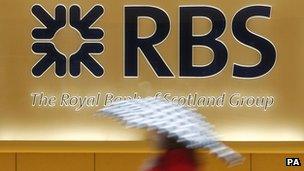Why RBS is shrinking its investment bank
- Published
- comments

Some would say it is a bit odd that Royal Bank of Scotland has taken so long to pull out of share trading, advising companies on takeovers and what used to be called merchant banking - a decision that will be confirmed on Thursday (and see my post RBS's investment bank to shrink).
The reason is that RBS has never been a leader in those activities.
Looking at investment banking in a wider sense, RBS's strengths are in bond trading, foreign exchange, cash management for big companies, and advising companies on debt. And it's staying in all of that - although the balance sheet of its so-called Global Banking and Markets division will be shrunk and made to work harder.
To be clear, these decisions should not be seen as in any fundamental sense making RBS "safer" or much less likely to pay big bonuses.
It wasn't RBS's equities business that contributed in any way to the collapse of the bank in 2008. The contribution to that debacle from Global Banking and Markets came from the debt business (especially the US operation that packaged up low-quality US housing loans into tradeable rubbish with an AAA badge).
Also, most of the really big bonuses in investment banking in general over the past few years have gone to the putative superstars of structured finance and debt markets, not stockbrokers and advisors on corporate takeovers.
So although the chancellor and Treasury would like to present what's happening as turning RBS into a sanitised modest conventional bank, which doesn't pay out fat rewards to big-ego investment bankers - the kind of bank that taxpayers who own 84% of it may feel prouder to hold in some sense - the facts don't really support that interpretation.
Actually, given that RBS is a world leader in government bond trading and has very strong debt-market relationships with big companies, it might well be irrational for taxpayers to wish that RBS would get out of those ostensibly more contentious operations - since such an exit would mean abandoning strong franchises that in the medium term may generate the profits that would allow taxpayers to get back at least some of the £45.5bn we've injected into the bank.
Also it would probably be bonkers or indeed suicidal for the Treasury to push RBS out of government bonds, since the government when borrowing would then become hugely dependent on just one bank, Barclays, for the distribution and sale of its own debt.
So the story of RBS's exit from equities is rather a conventional one: it's a division two player that has never really made much money.
RBS is retreating into the more specialised investment banking operation that it was in 2004 or 2005 or so - before Sir Fred Goodwin, the controversial former chief executive, decided that investment banking was one of the many areas where RBS could rule the world.
The shrinkage of investment banking will take the number of employees in Global Banking and Markets down from around 17,000 at the moment to less than 15,000. I am told that a couple of thousand left at the end of last year, so total job cuts would be around 5,000, including those who have already left.
As for where the axe will fall, much of the pain will be in Asia and North America. There will be an impact on employment in London, but perhaps less than some would expect.
The move could bring the final curtain down on an old and distinguished name in British corporate stockbroking, that of Hoare Govett - which was bought by RBS when it acquired the rump of ABN in 2007.
In a bit over a generation, Hoare has gone from being number one or two in corporate broking to a domestic brand that may just survive, if someone will take it off RBS's hands. But that's a sad story that's been repeated so many times in relation to the once-great names of the City that it's almost mundane.
If there is a wider significance to all this it is that there is an end to RBS's residual ambition to compete with the likes of Goldman Sachs, Barclays Capital and Deutsche Bank as a full-service global investment bank.
Is this a terrible blow to the pride and prestige of the City of London or to Edinburgh? Should we weep to see British financial services even more Wimbledonised - more dominated by foreign owned institutions, where we offer the best court or pitch in the world but where most of the players come from overseas?
Well some would argue that more important to the UK's economic future is that the likes of RBS provide greater support to indigenous small and medium size companies, tomorrow's big wealth creators, rather than offering a comfortable home for internationally mobile, highly paid investment bankers, some of whom pay tax here and some of whom don't.